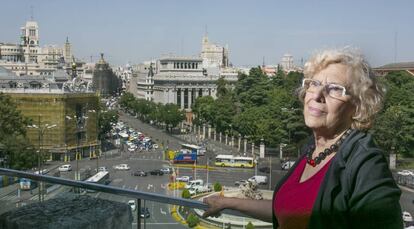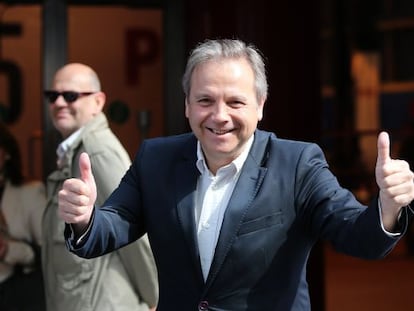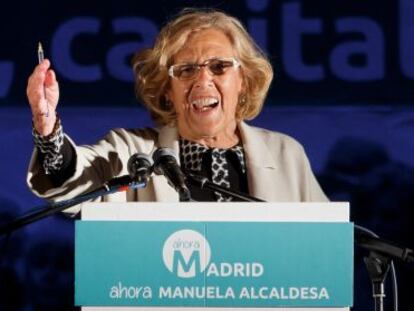Madrid Mayor: ¡°Cities can end the democratic apathy¡±
In this joint interview by EL PA?S, Le Figaro and La Repubblica, Manuela Carmena takes stock of her first year in office and talks about politics, ideology and the larger role of cities in the world

Madrid Mayor Manuela Carmena, who has held the job for a year and one month following tight municipal elections in May 2015, defends her ¡°total independence¡± from the parties that back her at City Council.
The 72-year-old former judge also insists that she has no ties to Podemos leader Pablo Iglesias, even though the anti-austerity party is part of the Ahora Madrid leftist coalition that Carmena headed during her mayoral bid.
Ahora Madrid came in second at the election with 20 councilors, behind the conservative Popular Party (PP)¡¯s 21. But a deal with the Madrid Socialists added nine more seats to Carmena¡¯s side, enabling her to become the first non-PP mayor since 1991.
Question. In view of Mariano Rajoy¡¯s potential reinstatement as Spain¡¯s prime minister, how do you feel about the fact that the left was unable to reach an agreement to give that job to Socialist nominee Pedro S¨¢nchez, following the first elections of December 20?
Cities are becoming places with more possibilities for greater citizen empowerment
Answer. The left gave an image of insufficient flexibility, of scant negotiating ability. And negotiation is a symbol of intelligence. Citizens realize when someone does not know how to negotiate.
Q. To what extent are Podemos¡¯ deteriorating results related to its political management of the towns and regions where it has been in power?
A. Well of course, I am not part of Podemos myself. I have complete independence. [¡] This administration is closely linked to my own name. People talk about Carmena. I played no role in the legislative election campaign. I have no ties to Pablo Iglesias. Not even contacts. Except for the fact that certain political parties have an interest in creating the impression that this tie exists, there is no tie.
Q. You recommended that S¨¢nchez and Iglesias should come to an investiture agreement for a leftist government in Spain. After the failure of those talks and the repeat election, would you understand it if the Socialist Party now decided to abstain at the next investiture vote in order to let the PP form a government?
Sign up for our newsletter
EL PA?S English Edition has launched a weekly newsletter. Sign up today to receive a selection of our best stories in your inbox every Saturday morning. For full details about how to subscribe, click here.
A. I don¡¯t want to get involved. It¡¯s not even my role as mayor. I am an occasional politician. I said that negotiating seemed to me like an intelligent thing to do. And the left did not exhibit a negotiating attitude. We are experiencing a crisis of the parties. They are putting their own interests ahead of citizens¡¯ interests. And that creates a gap that citizens later get them back for at the polls.
Q. Are you saying that ideological factors carry less weight at the city level?
A. Ideology is a way of labeling. Ideology seeks what separates people, not what unites them. That is a terrible thing, and it indicates that they are artificial differences, especially when you¡¯re dealing with specific things. Contemporary politics seeks segregation. Ahora Madrid is not a party. I manage different people and personalities. I negotiate with them. In one year, we have been a role model of consensus-seeking: 83% of agreements were reached through majorities, and 63% through unanimous decisions. That is why it makes no sense to project this partisan, radical image like the PP is doing. Ideology is theatrical rhetoric.
Q. Do you think there is a feminine sensitivity in the way public affairs are run in some places? There are female mayors in Paris, Rome, Barcelona, Madrid...
A. Yes. I have insisted repeatedly on the fact that women¡¯s culture is more closely linked to daily, practical affairs. It is the culture of life. Development policies underscore the active role of women, their role in family economics. Poverty programs rely on women. If there had been women at the helm of Spain¡¯s parties after the December 20 election, we would have had an agreement.
We want children to learn the value of dialogue and mediation, and for them to learn to solve their own problems among themselves
Q. What about the debate over big cities that take on state-level issues, from the environment to immigration?
A. Cities are taking on many powers that we have lawfully won. It happened with the refugees. We reached deals with the UNHCR to carry out a refugee welcome plan. We have the ability to set up structures, emergency services. It¡¯s simpler for us than for a big state apparatus. We have taken in people who arrived through irregular channels. They were helped. We have networks that the state lacks. We have to move on from a functional role to one of real power. We are closer to the problems on the ground.
Q. Do you consider it necessary to implement a cooperation network among the great European capitals?
A. There is a link among the cities. There are common concerns. I am thinking about participatory budgets. We did it in Madrid, but they could be organized with other cities for common projects. Lisbon, Paris and Madrid form a historical axis. Cities can end the democratic apathy. And like [UN Secretary General] Ban Ki-moon says, apathy is poison to democracy. European cities can counter this lack of mobilization. We need a framework for the relationship among them. We are capitalizing on a way of living history. It¡¯s not about the city-state, it¡¯s about overcoming a formal framework that is overwhelming to nations. Communications have put an end to borders, they have destroyed them. Cities are becoming places with more possibilities for greater citizen empowerment.
Q. At the same time, a major competition is now underway over the ¡°bounty¡± represented by Brexit.
A. There is a loyal competition underway. Madrid is very well placed ¨C because of our growth potential, our young people¡¯s talent and our competitive salaries. Also, Madrid is a very safe city, its transportation system is practically unmatched and the climate is extraordinary. We need to make the most of all those qualities.
Q. The Paris attacks led Madrid to organize a Peace Forum, to try to implement together with the French capital a preventive policy of sorts.
A. Yes, because we are aware that the big cities are also host to negative elements and a breeding ground for violence ¨C from gender violence to young criminal gangs. It all needs to go through a pro-peace education. And it starts at school. We want children to learn the value of dialogue and mediation, and for them to learn to solve their own problems among themselves.
Q. But don¡¯t you get the impression that all the major attacks in London, Paris, Madrid and Brussels have created a terrorist psychosis?
A. No matter how much cities feel psychosis over terrorism, citizens will not give up on life in their city. I did not see such a psychosis in Paris. I don¡¯t see it in Madrid, either, despite our own experience with terrorism. Cities do no give up on the notion of life that easily. And they are less susceptible than it may seem from the outside.
Q. You¡¯ve already said you will not seek re-election. What kind of city would you like to leave behind?
A. I would like to have achieved two things. For people to value the change in attitude, the closeness to the citizens, the clean ethics. And for them to appreciate the improvements to the city: Madrid will have more flowers, it will be greener and cleaner, more balanced and more fair.
Mathieu de Taillac is a correspondent for Le Figaro
Alessandro Oppes is a correspondent for La Repubblica
? Lena (Leading European Newspaper Alliance)
English version by Susana Urra.
Tu suscripci¨®n se est¨¢ usando en otro dispositivo
?Quieres a?adir otro usuario a tu suscripci¨®n?
Si contin¨²as leyendo en este dispositivo, no se podr¨¢ leer en el otro.
FlechaTu suscripci¨®n se est¨¢ usando en otro dispositivo y solo puedes acceder a EL PA?S desde un dispositivo a la vez.
Si quieres compartir tu cuenta, cambia tu suscripci¨®n a la modalidad Premium, as¨ª podr¨¢s a?adir otro usuario. Cada uno acceder¨¢ con su propia cuenta de email, lo que os permitir¨¢ personalizar vuestra experiencia en EL PA?S.
?Tienes una suscripci¨®n de empresa? Accede aqu¨ª para contratar m¨¢s cuentas.
En el caso de no saber qui¨¦n est¨¢ usando tu cuenta, te recomendamos cambiar tu contrase?a aqu¨ª.
Si decides continuar compartiendo tu cuenta, este mensaje se mostrar¨¢ en tu dispositivo y en el de la otra persona que est¨¢ usando tu cuenta de forma indefinida, afectando a tu experiencia de lectura. Puedes consultar aqu¨ª los t¨¦rminos y condiciones de la suscripci¨®n digital.










































